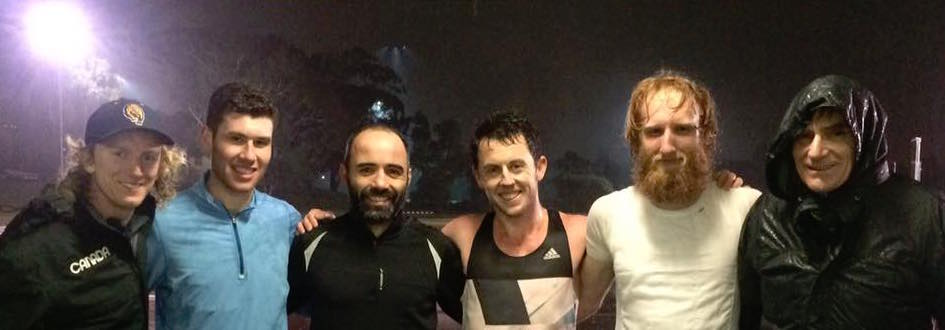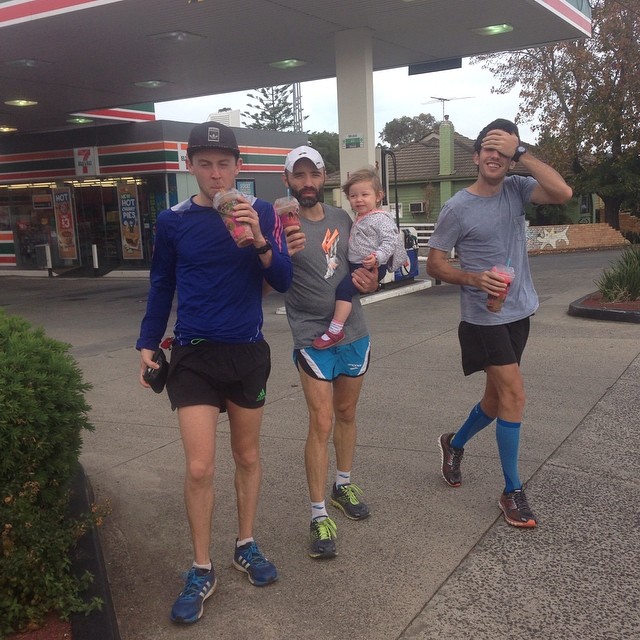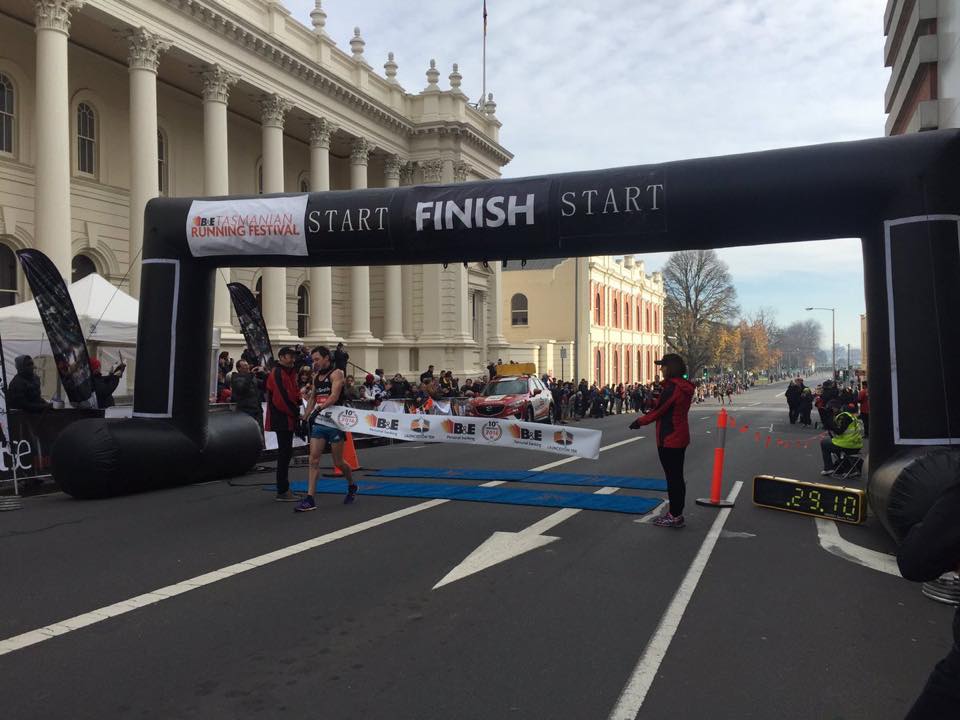
Q: What does it mean to you to be representing Australia in your Olympic debut?
It means a lot to me. Ever since I was a kid I’ve dreamt about representing Australia at the Olympics and now I’m going to finally fulfill that dream. It’s the biggest race I’ve ever prepared for so I’m looking forward to the challenge and pushing myself as hard as I possibly can for the green and gold.
Q: After placing fifth in the 2016 Warszawa Marathon, Poland in a time of 2:14.58 you had all but secured your spot on the plane to Rio. Can you talk us through the major physical/mental points of the race for you?
I was going into this race with huge amounts of pressure. It was the final day of the selection period and it was my last chance to qualify. After having two unexpected hamstring issues (on opposite hamstrings) in my last two marathons and having quite a very short turnaround from my last marathon, it was quite unknown how I’d get through the Warsaw marathon. We had worked out the cause of the two hamstring issues but it was still playing on my mind going into the race. The other factors that were playing on my mind were whether I was going to feel the effects of the short turn around between marathons, if I had de-conditioned or if the 120km-140km weeks were going to be enough to help get that time that I needed to make the team. Those thoughts played on my mind but the way I physically felt after Lake Biwa made me confident that I should still be able to run the time I needed to make the team. I treated and convinced myself that Lake Biwa was equivalent to a hard 28km race and 7km jog and that it wasn’t going to take too much fitness away from running Warsaw.
I went into the race thinking that if I could just break 2.15 then I’d be in the team. I set out for 2.15 and had a nice group to run with which were on about 2.14’15 pace. I felt comfortable and controlled but when our pack hit the strong winds at around the 23km mark I thought I could be in a bit of trouble… The pack started working against each other and no one wanted to take the lead. After a couple of very slow kilometres, I knew I was dropping time and just had to go for it on my own. One of the Polish runners tried to latch on to the back of me but the pace I was cranking into the wind was too fast for him. I had little thoughts creep into my head at the points where my hamstrings went in my previous two races but I was very confident that it wasn’t going to happen again. I was completely focused on holding the pace and felt strong over the last half of the race. There was a 3km patch along Vistula river towards the end of the race where I lost 8-10 seconds per km because of the winds but I got my pace back down right at the end to put myself under 2.15. Once I crossed that line and dipped under 2.15, I kind of knew I had done enough and thought it was going to be hard for the boys doing London marathon to push me out of the selection spots.
Q: Can you relate the emotions you felt after tweaking your hamstring at the 28km mark at the Lake Biwa Mainichi Marathon and evidently having to pull the plug?
It was tight from the start of the race but only caused issues when I lent too far over to grab my drink off the 28km drink station. Once I pulled it I knew I was in trouble. I dropped pace rapidly and by the time I got to the 35km mark I knew I wasn’t going to improve my previous time posted at Chicago marathon so I made the decision to pull the pin. I’ve never pulled out of a race before and believe that the races that you battle through when the going is tough, is what helps make you a stronger runner. My decision definitely wasn’t made lightly. I thought that there was still hope in maybe targeting another marathon and the wise decision was to pull the pin, make sure I don’t do any severe damage by running further and improve my chances of recovering and preparing for another marathon. In saying all this, I still felt ashamed of pulling out of the race and couldn’t quite shake that feeling of failure. I was quite emotional after that race after being in amazing shape and having those unexpected hamstring issues stop me once again from posting a time that I deserved and what quite possibly may have ruined my chances of achieving my ultimate goal of qualifying. Thankful that decision paid off.
Q: How important was your team/coach in supporting you to bounce back and compete successfully in Poland?
The support of my team and coach played a huge role in helping me bounce back. They had seen all the hard work I had put in and the form I was in so for them to reinforce this and the belief that I would easily back up definitely helped me gain confidence again.

Q: Can you cover a typical weeks training block currently?
One week out of my marathon program:
Monday: 22km in the heat chamber at Victoria University. The temperature was 25 degreess with the humidity at 85% and the pace I ran was about 4min per km.
General note about Monday’s: I usually run between 28-30km in the heat chamber on a Monday but cut the volume down for today to be fresh for tomorrow’s key session.
Tuesday: 5km warm-up 4x6km at sub 3min pace with 4min rest between reps. Done in 17.54, 17.57, 17.52 & 17.51. 5km cool down
General note about Tuesday’s: Tuesday sessions are usually the most important sessions of the week for me so I target these sessions and run them quite hard.
Wednesday: 30km long run at about 4.59per km pace. I was a little bit sore after last nights session so I just took it really easy and didn’t bother looking at the pace I was going.
General note about Wednesday’s: Wednesday I usually run about 35km with a kick down but in this program we’ve reduced the amount of kick down runs to focus more on recovery. I still do kick down runs on a Wednesday but that usually follows a much lighter session than a 4x6km or a 2x7km.
Thursday: 5km warm-up 8 continues lap of the athletics track doing 150m effort 100m jog 100m effort and 50m jog. I did the 150’s in 21’s and the 100’s in about 14’s. Then I did 4x60m hill sprints with Mitch with a walk back recovery. They weren’t fast but I felt like I turned over the legs quite well considering how sore I felt the day before. 15km cool down
General note about Thursday’s sessions: They are usually a lighter session than a Tuesday and work more on speed and/or getting the legs going again. Sessions like sprints, hill sprints, wind sprints or mona fartleks.
Friday: 23km in the heat chamber at Victoria University. Today we increased the temperature to 28degrees with the humidity at 85%. I ran about 3.40per km pace.
General note about Friday’s: I usually run between 25-30km in the heat chamber on a Friday but I finished work quite late and arrived at Victoria University about an hour later than usual.
Saturday: 10km warm up 6.2km relay leg for Athletics Essendon. My relay split was 17.59 which was slower than my split from last year but probably a bit more reserved. 10km cool down
General note about Saturday’s: Saturday sessions are usually a threshold run for about 10-12km sometimes further. Because today’s AV race was a bit shorter I ran it just a little bit quicker than my usual threshold pace.
Sunday: 40km long run around Yarra flats area. Pace roughly 4.30per km.
General note about Sunday’s: 40km is the stock standard long run for me during my marathon preparations/programs.
Total mileage/volume for the week was: 196.6km
People are probably asking why there aren’t any doubles and the reason to that is because I start work early and this is the most time efficient way. In particular this week I worked 43 hours in total.

Q: After leading from start to finish in winning the Launceston 10 with a time of 29:10, you’re obviously in some cracking form. With the speed evident and a solid current training block coming together nicely, is a sub 2:12 within reach in the near future?
I was actually quite pleased with the 29.10 in Launceston. I was just coming out of an absorption type phase (lighter training) and started getting into my first couple of high mileage weeks. I hadn’t really done any tough sessions in particular so to run that time early on in my program definitely helped with the sessions over the last few weeks. I definitely feel like a sub 2.12 is achievable but considering that only two other Aussies have ever gone under 2.12 in Olympic marathons it’s probably unlikely that it will happen at this Olympics. Hopefully sometime in the near future.

Q: Is the marathon actually your favourite racing distance and why?
Haha, it probably is my favourite distance but because I’ve done so many over the last year and missed last year’s track season, I’m kind of looking forward to doing some 5km and 10km track races this summer and hopefully lowering some track PB’s. The aspect that I love about marathon running is the toughness of the race and that physical and mental battle that you get towards the end of the race when the body starts to shut down.

Q: Will you be bringing a race plan and potential target times into Rio?
I don’t have an exact plan just yet. There is still a few weeks of hard training to be done so after that I should have a better understanding of what shape I will be in. The shape I think I’m in will be a major factor in determining the pace I will run. So far my thoughts are that the weather could be a major factor in this race and that if I’m a bit more controlled or reserved through halfway then I should be able to run an even race or better yet finish off stronger. Tactics can change during the race depending on what’s going on around you but I can tell you this, though… I definitely won’t be getting caught up in Kenyan surges early on in the race like I did in Glasgow.
Cheers, Liam
Comments are closed.